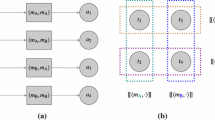Abstract
Signaling games with reinforcement learning have been used to model the evolution of term languages (Lewis 1969, Convention. Cambridge, MA: Harvard University Press; Skyrms 2006, “Signals” Presidential Address. Philosophy of Science Association for PSA). In this article, syntactic games, extensions of David Lewis’s original sender–receiver game, are used to illustrate how a language that exploits available syntactic structure might evolve to code for states of the world. The evolution of a language occurs in the context of available vocabulary and syntax—the role played by each component is compared in the context of simple reinforcement learning.
Similar content being viewed by others
References
Barrett, J.A. (2006), Numerical simulations of the Lewis signaling game: learning strategies, pooling equilibria, and the evolution of grammar, UC Irvine Institute for Mathematical Behavioral Sciences Preprint (22 2006). http://www.imbs.uci.edu/tr/abs/2006/mbs06_09.
Bereby-Meyer Y., Erev I. (1998) On learning to become a successful loser: a comparison of alternative abstractions of learning processes in the loss domain. Journal of Mathematical Psychology 42: 226–286
Lewis D. (1969) Convention. Cambridge, MA: Harvard University Press
Herrnstein R.J. (1970) On the law of effect. Journal of the Experimental Analysis of Behavior 13: 243–266
Huttegger, S. (2007a), Evolution and the explanation of meaning, Philosophy of Science.
Huttegger, S. (2007b), Evolutionary explanations of indicatives and imperatives, Erkenntnis.
Roth A., Erev I. (1995) Learning in extensive form games: experimental data and simple dynamical mod3els in the intermediate term. Games and Economic Behavior 8: 164–212
Skyrms B. (1996) Evolution of the social contract. Cambridge: Cambridge University Press
Skyrms B. (2004) The Stag Hunt and the Evolution of Social Structure. Cambridge: Cambridge University Press
Skyrms, B. (2006), Signals Presidential Address. Philosophy of Science Association for PSA 2006.
Skyrms B., Pemantle R. (2000) A dynamic model of social network formation. Proceedings of the National Academy of Sciences in the USA 97: 9340–9346
Author information
Authors and Affiliations
Corresponding author
Rights and permissions
About this article
Cite this article
Barrett, J.A. The Evolution of Coding in Signaling Games. Theory Decis 67, 223–237 (2009). https://doi.org/10.1007/s11238-007-9064-0
Received:
Accepted:
Published:
Issue Date:
DOI: https://doi.org/10.1007/s11238-007-9064-0




